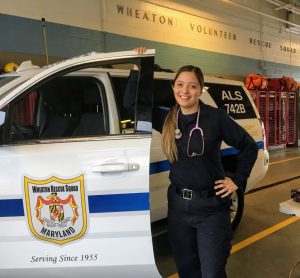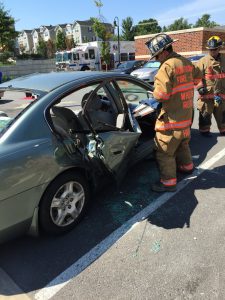Services Provided
We have three main types of emergency response we provide. Basic Life Support includes our EMTs on ambulances. Advanced Life Support includes our Paramedics in our chase cars. Heavy rescue includes our firefighters on our heavy rescue squad.
Basic Life Support
Basic Life Support (BLS) services are provided by one of our four ambulances, staffed by at least two experienced Emergency Medical Technicans (EMTs). Ambulances are equipped to handle calls for assistance for illness and injury not requiring intensive care. The Wheaton Volunteer Rescue Squad owns and operates four ambulances.
Advanced Life Support
Advanced Life Support (ALS) services are the highest level of pre-hospital emergency care available. All ALS units are staffed by at least one Paramedic, in addition to an EMT driver.
ALS units are equipped to handle calls for cardiac or respiratory emergencies such as chest pain, heart attack, trouble breathing, or cardiac arrest, as well as allergic reactions, traumatic injury, and any other call requiring mobile intensive care. Advanced Life Support skills can include establishment of a IV line, administration of medications, consultation with a physician at a medical control hospital, defibrillation, and other necessary techniques.
The Wheaton Volunteer Rescue Squad provides Advanced Life Support services in Wheaton, Kensington, Kemp Mill, Layhill, and parts of the surrounding Colesville, Rockville, Silver Spring and Aspen Hill areas. WVRS owns and operates two ALS-equipped paramedic chase car units.
Heavy Rescue
Our Heavy Rescue Squads respond both to fire and to rescue calls. At the scene of a fire, the rescue squad’s primary responsibility is to search the fire building and rescue anyone in need of help. The rescue squad also performs ventilation of the building, lighting of the exterior and interior of the building, control and shutoff of utilities such as gas and electricity, monitoring for hazardous atmospheres and conditions, and salvage or overhaul after the fire has been controlled.
At a rescue call, Rescue Squad crew members may provide medical care to victims of illness or injury, use hydraulic rescue tools (aka “Jaws of Life”) to extricate patients trapped in vehicles after accidents or trapped in industrial machinery, rescue persons trapped in water or at heights, or detect and monitor hazardous atmospheres and environments. The rescue squad also responds to elevator emergencies, fire alarms, water rescue incidents, and many other calls for help requiring a special service apparatus.
What else do we do?
Besides responding to emergencies and keeping the station equipment operational, our biggest effort is training. Our members undergo intensive training within their first year. We also maintain a continuing education program to keep everyone from the station chief to the newest cadet current with the latest techniques.
In addition, being active within our community is an important part of our Rescue Squad. Our community services include:
- Tours for groups
- Advisors for scouts
- Speakers for clubs and meetings
- Cadet Program for teens (ages 16 to 17)
- Sponsor of the First Aid Program for high school students

